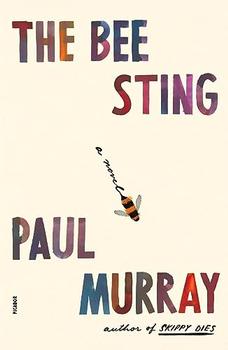Summary | Excerpt | Reviews | Beyond the Book | Readalikes | Genres & Themes | Author Bio

A Novel
by Paul Murray
But the slowdown quickly became more of a freefall. An air of dread gathered over the showroom. And she used to love to visit it! From the wings she would gaze at the dazzling bodywork, the gleaming newness that was almost overwhelming. Then she would sit in the display models in turn, imagining a different life to go with each: princess, explorer, scientist, fairy. Now she couldn't bear it. The unloved, unbought cars, still dazzling desperately, reminded her of stray dogs in the pound, waiting to be put down.
Dad did his best to comfort her. Things will pick up, he said. It's all cyclical. But that only tightened the knot in her stomach.
Dickie Barnes was not a natural salesman. Often, when Cass called in to the showroom, he would be sitting in his office, reading a book. If he did happen to be on the shop floor, that was almost worse. Someone would come in looking for a new car, and he would steer them towards a used one. If they wanted a used one, he'd push them in the direction of a smaller, cheaper model. More than once she'd heard him talk people out of buying cars altogether.
When this was put to him, Dickie liked to quote his father, Cass's granddad, who had said that the key to the business was not selling cars, but building relationships. Once the customer trusts you, he's with you for life, he said. And by way of proof, he'd point out to the street, where you could see the Maurice Barnes Motors sticker in the back window of every third car that went by.
But now the customers had stopped coming.
It wasn't Dad's fault. There had been a crash. That was the word they used on the news: it made Cass think of something sudden and explosive, a car hitting a wall. But this crash was slow – in fact it had been going on for years – and nothing had exploded. Nothing had happened at all that you could see, yet somehow, because of this crash, there was no more money. Even the banks were out of money. Last year the microchip factory had let a hundred people go; half the shops on Main Street had an A4 page in the window, thanking customers for their many years of loyalty. Everyone was in the same boat.
And yet some people were in a different boat.
Elaine's dad had 'gone in' with a developer on a small estate of houses, carved out of the woods behind Cass's family's land. Now the developer had gone bust, and the unfinished houses were mouldering away; Elaine told her Big Mike was spending three days a week up in Dublin now, arguing with lawyers. But somehow as well as summer holidays in France, he had taken his family skiing in the autumn midterm break; they still had a standing order of lobster at the delicatessen, and every Sunday at Mass they sat up at the very front.
That man is nothing but a crook, her mother said. She couldn't stand Big Mike, with his smirk, and his investments, and his Gucci cowboy boots. And him only a yahoo, that grew up on handouts from the Lions!
But he knew how to use his loaf, which was more than she could say for some people.
Cass's mother was not handling the downturn well. She had always been an assiduous shopper. She knew every delivery man in town by name; her walk-in wardrobe was a secret paradise of unworn sweaters and shawls, boots that crowded the shoe-rails like giddy dancers, waiting to pour onto the stage. Now, with things the way they were, she couldn't even shop in the sales. For Imelda, this was like a death sentence. Other than Tidy Towns meetings, which took place in the back room of the Olivia Smythe boutique on Main Street, she had largely stopped going out.
At home, with no one to look at her, she fell into black, ugly moods. She'd lie on the couch with a magazine propped against her crossed legs, snapping the pages so loud Cass could hear it from upstairs. Then with a hiss of dissatisfaction she'd toss it aside, and go stalking from room to room, clicking her fingers – 'active', but with nothing to do, like a grounded teenager, or a supercharged pensioner in an old folks' home – before deciding on something guaranteed to make her angry, like attempting to bake a soufflé, or knitting socks.
Excerpted from The Bee Sting by Victoria Christopher Murray. Copyright © 2023 by Victoria Christopher Murray. Excerpted by permission of Farrar, Straus & Giroux. All rights reserved. No part of this excerpt may be reproduced or reprinted without permission in writing from the publisher.
Your guide toexceptional books
BookBrowse seeks out and recommends the best in contemporary fiction and nonfiction—books that not only engage and entertain but also deepen our understanding of ourselves and the world around us.